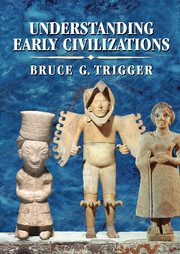Book contents
- Frontmatter
- Contents
- List of Illustrations
- Preface
- Understanding early civilizations
- Introduction
- Sociopolitical organization
- Economy
- 14 Food Production
- 15 Land Ownership
- 16 Trade and Craft Specialization
- 17 Appropriation of Wealth
- 18 Economic Constants and Variables
- Cognitive and symbolic aspects
- Discussion
- References
- Index
14 - Food Production
Published online by Cambridge University Press: 05 June 2014
- Frontmatter
- Contents
- List of Illustrations
- Preface
- Understanding early civilizations
- Introduction
- Sociopolitical organization
- Economy
- 14 Food Production
- 15 Land Ownership
- 16 Trade and Craft Specialization
- 17 Appropriation of Wealth
- 18 Economic Constants and Variables
- Cognitive and symbolic aspects
- Discussion
- References
- Index
Summary
Gordon Childe (1928), Karl Wittfogel (1938), Julian Steward (1949), and many other social scientists believed that early civilizations originated in river valleys located in arid or semiarid regions where, as a result of irrigation works, rich, easily worked soils fed large rural populations, produced surpluses that supported many full-time craft specialists, and allowed a ruling class to live in luxury. Many Old World prehistorians continue to hold this view (Hassan 1997: 51). Yet primary civilizations evolved in many different kinds of environments: river valleys in warm, arid regions (Egypt, Mesopotamia), tropical forests and tropical forest-savanna borderlands (Maya, Yoruba), mountainous valleys of different sizes, shapes, and elevations (Peru, Valley of Mexico), and temperate rainfall zones (Shang China). Early civilizations are associated with vast differences in temperature, rainfall, elevation, topography, soil fertility, and microenvironmental diversity. In addition, very different assemblages of domesticated plants and animals constituted the basis of food production in different parts of the world, with no significant overlap between the Eastern and Western Hemispheres. These domesticates, often considerably transformed from their wild ancestors, and knowledge of how to care for them were part of the cultural heritage from earlier phases in the development of each region. Early civilizations are found in temperate or hot climates rather than in cold ones (Northern China, where the average temperature in January would have been close to the freezing point, and highland Peru were borderline cases) and in areas with light, easily worked soils and without dense, deeply rooted grasses.
- Type
- Chapter
- Information
- Understanding Early CivilizationsA Comparative Study, pp. 279 - 314Publisher: Cambridge University PressPrint publication year: 2003



